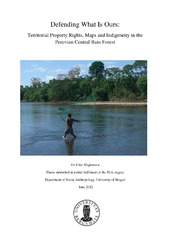Defending what is ours: Territorial property rights, maps and indigeneity in the Peruvian central rain forest
Master thesis
Permanent lenke
https://hdl.handle.net/1956/5975Utgivelsesdato
2012-06-21Metadata
Vis full innførselSamlinger
Sammendrag
The aim of the thesis is to identify and analyse central dynamics in the encounter between the indigenous population and settlers in a Native Community in the Peruvian central Amazon. The indigenous residents are subsistence farmers, practice hunting, fishing and hold domestic animals. This implies that the territory is crucial in their everyday life. Having the settlers inside if the community therefore brings great consequences as this makes land become scarce. The indigenous population employs different methods in defending their territorial property rights against invasion. They make use of both essentialist and constructionist discourses of indigeneity which both implies having to act within a space not of their own creation. The same applies when they use maps in defending their rights. These are schematic representations of a complex reality and are made by people not being implicated in the landscape in the same way as they are themselves. Nevertheless there are not only external forces affecting their potential in defending their rights. There are some disunity among the residents among other things manifest in the lack of trust towards the leaders. The leadership structure in the community is a state invention and this makes it difficult for the leaders to live up to both the expectations from the residents as well as the state also requiring certain thing from the leader. When the people do not collaborate this furthermore affect the mobilization potential in countering the external pressure on their territories.
